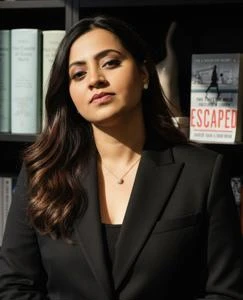Dr Ruhi Khan

Connect
About
Dr Ruhi Khan, FRSA, FHEA, is an interdisciplinary researcher, journalist, and editor whose work bridges gender, media, and technology studies with a sustained focus on postcolonial societies and marginalised communities.
She is currently the research officer on the AHRC-funded project, Crafting Sustainability and Equitability: Reconstructing Pasts and Futures in the Indian Creative Economy, in LSE’s Department of Gender Studies.
She holds an ESRC-funded PhD in Media and Communications from LSE. Her research interrogates the entanglements of media, politics, and democracy, with a particular focus on coloniality in feminism, technology and media. She calls for a feminist campaign against patriarchal AI and advocates for global co-creation to resist AI colonialism. She is a Fellow of the Royal Society of Arts, a member of UN Women UK and a faculty affiliate of LSE’s Data Science Institute. She was previously the project manager of the global study COVID-19 & Media: Inequality, Privacy, and Ethics (2020–2021) at LSE’s Media and Communication Department.
As a Fellow of the Higher Education Academy, she is committed to inclusive pedagogy, innovative curriculum design, and student mentoring and supervision. Ruhi is also involved in teaching in the Media and Communications department, including courses like International Media and the Global South and Dissertation Skills. She has previously taught the Data in Society: Researching Social Life course in LSE’s Department of Sociology.
Alongside research and teaching, Ruhi is editor of the LSE Media Blog, commissioning and translating scholarship into public dialogue, policy insight, and creative dissemination. With over 15 years of experience as an international journalist, Ruhi has covered war, elections, international crime, foreign policy and diplomacy. She is also the Managing Editor of Living Bridge, an annual magazine on the UK–India partnership in higher education and serves as the strategic communications director of the India UK Achievers Honours. Ruhi’s work combines academic excellence, professional expertise, and public engagement.
Ruhi holds an MSc in Media & Communication (Data and Society) from LSE, an MA in International Journalism from City, University of London, and a degree in Business Management from the University of Mumbai, where she majored in financial management. As a Jefferson Fellow at the East-West Center, Hawaii, USA, she researched redevelopment and creative economies in Mumbai and China, and is a recipient of the Mary Morgan Hewitt Award for Women in Journalism. She is co-author of Escaped: Indian Fugitives in London (Penguin, 2021), which explores financial crime, extradition, and foreign policy.
Key Expertise: Gender, Media, Creative Economies, Technology, AI, Global South, India
Research
Crafting Sustainability and Equitability: Reconstructing Pasts and Futures in the Indian Creative Economy (2025-2027): This research concentrates on an essential part of India’s creative economy: the traditional handicrafts sector. It examines sustainability and sustainable practices related to the environment and labour in traditional handicrafts and textiles, to address inequalities from an intersectional perspective and evaluate how and to what extent traditional practices can be integrated into the creative economy to ensure long-term environmentally, culturally, and socially sustainable development. This research is led by the Department of Gender Studies at LSE, and funding is provided by the Arts and Humanities Research Council (AHRC), UK Research and Innovation.
COVID-19: A Communication Crisis – Ethics, Privacy, Inequalities (2020-2022): This project is a cross-national media analysis of the representations of COVID-19 inequalities from an intersectional perspective. Specifically, the project interrogates how mainstream media reaffirm and/or contest the intensification of inequalities in the context of a pandemic. This question is addressed through a dual lens, focusing on both the narrative representations (in news reporting) and the visual representations (in data visualisations) of the pandemic in mainstream media. This project is a part of the LSE Media and Communication department’s Knowledge Exchange and Impact initiative.
Feminism, Media and Technology in post-colonial contexts (2019-2025): This UKRI’s Economic and Social Research Council (ESRC)-funded doctoral research is situated at the intersection of histories of feminism and the continuing coloniality of gender relations and the rise of neoliberal far-right politics in media texts and feminist discourses in the Global South. By identifying three colonial harms to women’s movements – erasure, appropriation and ambiguity – this research delves into the media discourses and technological affordances that are often embedded with biases that inflect and/or curtail the rhetoric and practices of contemporary feminist movements and explores the ambiguous pathways for feminist agency through notions of self-obscurity and platform opaqueness, thus making an original contribution to the literature on decolonial feminist studies through the conceptualisation of equivocal agency.
Women MPs in Westminster: Gendered spaces and identity construction (2019): This research argues that the historical spaces that chart the 100-year journey of women in Parliament – the Ventilator, Cage and Tomb - echo in the politico-media discourse of today in terms of invisibility, sexism and Otherness. By studying columns written by women members of parliament in 2018, this research explores how women MPs themselves are challenging the way Westminster and the media frame their identity by displacing the normative masculine standpoint of the production of knowledge in politics. It shows how they are asserting their voice through their columns to deconstruct stereotypical representations and construct their own intersectional identity.